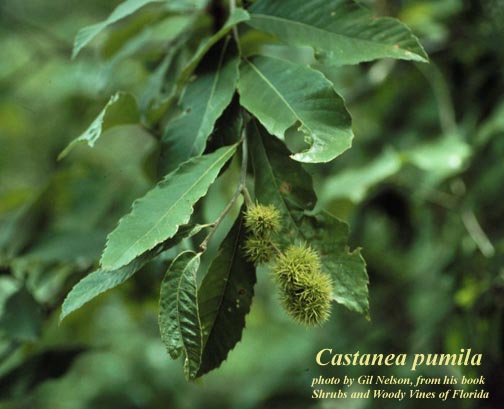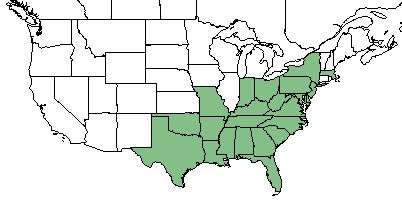Difference between revisions of "Castanea pumila"
(→Ecology) |
(→Ecology) |
||
| Line 40: | Line 40: | ||
''C. pumila'' is found mostly in fire-maintained habitats. <ref name= "Weakley 2015"/> It is not fire resistant, but has a high fire tolerance. <ref name= "USDA Plant Database"/> | ''C. pumila'' is found mostly in fire-maintained habitats. <ref name= "Weakley 2015"/> It is not fire resistant, but has a high fire tolerance. <ref name= "USDA Plant Database"/> | ||
<!--===Pollination===--> | <!--===Pollination===--> | ||
| − | + | ===Use by animals <!--Herbivory, granivory, insect hosting, etc.--> | |
| + | ''C. pumila'' is highly palatable to browsing animals and is edible by humans, but is not very palatable to grazing animals. <ref name= "USDA Plant Database"/> | ||
===Diseases and parasites=== | ===Diseases and parasites=== | ||
''C. pumila'' is relatively resistant to chestnut blight. <ref name= "Weakley 2015"/> | ''C. pumila'' is relatively resistant to chestnut blight. <ref name= "Weakley 2015"/> | ||
Revision as of 19:04, 18 May 2018
| Castanea pumila | |
|---|---|

| |
| Photo by the Atlas of Florida Plants Database | |
| Scientific classification | |
| Kingdom: | Plantae |
| Division: | Magnoliophyta - Flowering plants |
| Class: | Magnoliopsida - Dicots |
| Order: | Fagales |
| Family: | Fagaceae |
| Genus: | Castanea |
| Species: | C. pumila |
| Binomial name | |
| Castanea pumila (L) Mill. | |

| |
| Natural range of Castanea pumila from USDA NRCS Plants Database. | |
Contents
Taxonomic Notes
Synonyms: C. pumila var. ashei Sudworth; C. alnifolia Nuttall var. alnifolia; C. alnifolia var. floridana Sargent; C. ashei (Sudworth) Sudworth; C. floridana (Sargent) W.W. Ashe; C. alnifolia
Varieties: Castanea sativa P. Miller
Description
C. pumila is a perennial shrub/tree of the Fagaceae family native to North America. [1]
Distribution
C. pumila can be found along the southeastern coast of the United States, from Texas to Massachusetts. [1]
Ecology
Habitat
C. pumila is found in xeric forests and woodlands. [2]
Phenology
C. pumila flowers March-June. [3]
Fire ecology
C. pumila is found mostly in fire-maintained habitats. [2] It is not fire resistant, but has a high fire tolerance. [1] ===Use by animals C. pumila is highly palatable to browsing animals and is edible by humans, but is not very palatable to grazing animals. [1]
Diseases and parasites
C. pumila is relatively resistant to chestnut blight. [2]
Conservation and Management
Cultivation and restoration
Photo Gallery
References and notes
- ↑ 1.0 1.1 1.2 1.3 USDA Plant Database https://plants.usda.gov/core/profile?symbol=CAPU9
- ↑ 2.0 2.1 2.2 Weakley, A. S. (2015). Flora of the Southern and Mid-Atlantic States. Chapel Hill, NC, University of North Carolina Herbarium.
- ↑ PanFlora Author: Gil Nelson URL: http://www.gilnelson.com/PanFlora/ Date Accessed: 5/18/18